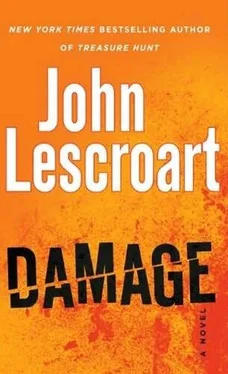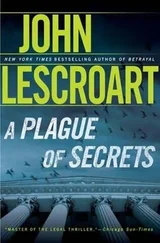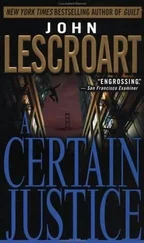“My brother? Are you kidding? He wants to keep them forever.”
“Maybe we could do a little negotiation. Get a night away.”
“I could do that.”
Glitsky took a breath. “I wasn’t sure we were okay. We’re okay?”
“We’re different, but okay. I don’t do the risk thing so well.”
“You shouldn’t have to.”
“You shouldn’t, either.”
“Well, then I should change jobs.”
“Which you don’t want to do.”
“No. I don’t. Somebody’s got to hang in there and do it, and I’m temperamentally suited. It’s a curse but it’s who I am.”
“I know. And I don’t want you to change. I love who you are.”
A sudden surge of emotion made his head go light. He put his hand up to steady himself against the wall. “I’ll call when I know what time I’ll get in at Burbank,” he said.

Lou the Greek’s opened for business at six o’clock in the morning every day but Sunday. The bar/restaurant occupied a semi-hygienic, semi-subterranean space directly across the street from the Hall of Justice, and this location made it a favorite for cops and jurors and lawyers. At lunchtime, it tended to be packed with humanity, the tiny tables and six-person booths equally hard or impossible to come by, and this in spite of the fact that the only item on the menu was the special, a mostly edible, sometimes not, sometimes delicious combination of flavors and textures drawn from the rather disparate culinary cultures of both Greece and China. Only Greece and China. Lou’s wife, Chiu, upon whom the Chronicle had a few years before bestowed the sobriquet “Most Creative Chef in the City,” had an undeniable knack, no doubt about it-souvlaki char siu bao, barbecue red pork moussaka, hot and sour and lemon curd dolma stew, crispy duck pita pockets, and the ever-popular and mysterious yeanling clay bowl.
But before lunchtime, and especially in the early morning, Lou’s was a haven for serious drinkers, not so much the indigent or homeless alcoholics as one might suspect, but in general a well-dressed and bleary-eyed clientele of men and a few women who often were in line down the steps to the front door by the time Lou opened up at the crack of dawn. The stools at the bar, which had closed four hours earlier, were usually filled up before Lou could ring up the first sale.
On this Friday morning, though, the main action wasn’t at the bar, but in the booth farthest from it along the right-hand wall. And nobody was drinking anything alcoholic. A galvanized Farrell, positively dapper in Armani, had made some important decisions and in fact had already sprung into action during the night, and finally he’d contacted the principals who would need to be involved in his plan and told them that he needed them at Lou’s by seven A.M.
So he was sitting against the wall next to Amanda Jenkins and looking across the table at Glitsky and an uncomfortable Vi Lapeer. Everybody had already expressed their condolences and outrage about Wes’s dog, Gert, then said nice things to Abe about the morning’s “CityTalk” column, and after that vein had played itself out, Farrell drank some of his coffee, cleared his throat, and spoke in a voice that though firm was so quiet that it could have been a stage whisper.
“This is the most off-the-record conversation any of you will ever have with me. I would vastly prefer it if not one word of it got out to anyone beyond the four of us. Is that acceptable to all of you?”
Eyebrows went up in surprise all around the table, but no one objected, and within a few seconds all nodded their assent.
“All right, then,” Farrell went on, “I’ve asked you all here this morning because after all he and his family have put us all through the last couple of weeks, I’ve decided that enough is enough. It’s my intention to get Ro Curtlee back behind bars by tonight.”
“Fuckin’ A,” Jenkins said, pumping her fist. “ Yes! ”
Although he nodded again in apparent agreement, Glitsky’s brows came together in his default frown while Chief Lapeer, sitting across from Farrell against the wall, squinted in consternation, threw a quick glance at Glitsky, then came back to Wes. “How are you planning to do that?”
“The short answer is that I’m going to indict him.” He spent a few moments bringing everyone up to speed on the grand jury, explaining the relatively newly hatched strategy of tying via motive Ro’s earlier conviction to the current crimes he was suspected of committing, thus creating the special circumstances Farrell would need to outright deny him bail.
When he finished, Amanda had a perplexed look on her face. “I understand the strategy, Wes, but the grand jury doesn’t meet until Tuesday, and even then…”
But Farrell was shaking his head. “I’ve called them into emergency session this morning at eight o’clock.”
“This morning? But how did you…?” Amanda began.
“I called them at home last night. I got fourteen of them to commit to be there and left messages for the other six, and I only need twelve. So we’re good to go.”
“Except that I’m not nearly prepared.”
“That’s not going to be your problem. You know the basic argument. That’s what you’re going to give them.”
“But without any new evidence, it’s not going to be enough.”
“We’ve got solid gold evidence from the original trial. For Sandoval , I already have the good Dr. Strout coming in to say she was raped. I’ve got the evidence tech to say that the sperm in her was Ro’s. And since Nuñez is dead, we can read her transcript into the record. That’s all we should need for her.
“Then Strout can talk about how Nuñez is dead, the crime scene guys say that the body was naked except for she was wearing shoes, and Arnie Becker says it was arson. We get a detective to say that Ro was out on bail facing a trial during which Nuñez was expected to testify. That gives us multiple murder specials and the specials of murdering a witness to prevent testimony.”
Jenkins, obviously excited by these possibilities, still had her doubts. “What about Janice Durbin? We have a Johnson problem.” She was referring to the case that requires the district attorney to tell the grand jury about possible exculpatory evidence. “If we try to subpoena Curtlee’s alibi for Durbin, which is his parents, they’ll know what we’re doing. Denardi will at least delay the whole thing, maybe block it indefinitely.”
“Right,” Farrell said. “So here’s what we do. We get the indictments for Sandoval and Nuñez first. We start the grand jury on Durbin, maybe even present a couple of witnesses, then we subpoena Ro’s alibi-his parents and employees-but by then he’s already in custody for the first two, and they can screw around as much as they want. When we get the indictment for Durbin, we join it up to the other two. We don’t, we still have him in jail on multiple murder, no bail.” He looked around at a quorum of clear skeptics. “Listen, I’ve spent thirty years hearing that as far as the grand jury is concerned, any DA worth his salt could indict a ham sandwich. Well, I guess we’re going to find out if I’m worth my salt and prove it once and for all if we can.”
“But doesn’t that mean you’ll have to try him on those charges?” Lapeer asked.
“Eventually, maybe.”
“I thought it was within sixty days,” Glitsky said.
Farrell allowed himself a self-satisfied smile. “Yes, and if Ro’s lawyers want to argue that they’re ready to go to trial in sixty days, guess what? Then they’re obviously ready to defend him on the remand trial, aren’t they, since it’s the exact same case? They can’t have it both ways.”
Читать дальше













